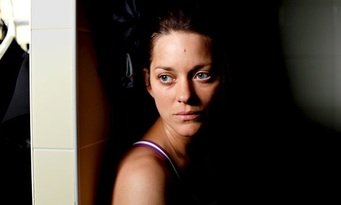
CAST & CREDITS
Featuring Marion Cotillard
Matthias Schoenaerts & Armand Verdure
Directed by Jacques Audiard
Written by Mr. Audiard and Thomas Bidegain
In French, with English subtitles
Rated R 122 Mins.
Reviewed by Kenneth Turan - LA Times
Romantic but pitiless, fearlessly emotional as well as edgy, "Rust and Bone" is a powerhouse. It's the kind of risky venture only a consummate filmmaker could manage, and then only with the help of actors who are daring and accomplished. With director Jacques Audiard in charge and Marion Cotillard and Matthias Schoenaerts as stars, all the pieces have fallen exactly into place.
Although "Rust and Bone" is old fashioned and sentimental at its core, this film's idea of romance is not everyone's, and it's certainly not Jane Austen's. The story details the relationship between an arrogant trainer of orcas whose world is shattered when she loses her legs and a brutish street fighter whose thoughts are exclusively about himself. It's set in a bleak and violent contemporary France where we worry about the protagonists' physical and psychological well-being because we know we have to.
Audiard, whose last film was the exceptional, Oscar-nominated "A Prophet," has always been interested in extreme situations and the people who make their way in them. This time, he's created an unapologetically melodramatic film (inspired in part by Lon Chaney/Tod Browning silents like "The Unknown") whose aim, he said frankly at the film's Cannes premiere, was "to look emotions in the eye and take them to the end, even to risk going too far and being excessive and ridiculous."
But if "Rust and Bone" is an unashamed melodrama, it is melodrama executed by a film artist with a gift for the genre. Starting from a short story collection by Canadian Craig Davidson and working with co-writer and frequent collaborator Thomas Bidegain, Audiard is an exact calibrator of cinematic effects, someone who knows precisely how far he can push a given situation.
Having constructed what is essentially a two-character drama, Audiard has been fortunate in the actors who bring it to life. Cotillard, a regular for director Christopher Nolan and a lead actress winner for "La Vie en Rose," and Belgian actor Schoenaerts, who staggered audiences last year with his role in the Oscar-nominated "Bullhead," convincingly convey a range of emotions that is way out of the ordinary.
It is Schoenaerts' Ali we encounter first, a former boxer walking with unwavering determination and trailed by his 5-year-old son, Sam (Armand Verdure), an uncertain child he barely knows. Scrounging and scuffling, these two end up in Antibes, in France's south, staying with Ali's sister Anna (Corinne Masiero), a woman he has not seen in five years.
Clearly, personal relationships are not Ali's strength. He is a bruiser, physically and psychologically, and Schoenaerts, gifted at playing both sides of that equation, expertly creates a detached, self-involved man no one gets close to. When Ali says, as he frequently does, "I could care less," you know he means it.
Ali signs on as a bouncer at a hot club called the Annex, where he encounters Stephanie (Cotillard). An angry, on-edge woman who enjoys provoking men, Stephanie is as much trouble as Ali. He meets her in his professional capacity because she has incited a brawl in which she has been knocked out.
Driving her home, Ali, ever the diplomat, matter-of-factly tells Stephanie that she dresses like a whore. In her apartment, when he takes note of some photos of her training killer whales at Antibes Marineland, she snaps back, "You're surprised a whore can train orcas." Ali leaves his phone number as a reflex, but he could care less if she calls, and she doesn't.
Then, quickly, unimaginably, Stephanie loses her legs in an orca attack. While state-of-the art CGI work makes her diminished body undeniably real, it is Cotillard's magnificent acting that makes what has happened to her believable. Stephanie's no-holds-barred hysteria, followed by desperation, pain and despair, is communicated largely without words in a performance that is remarkable for vulnerability thrillingly conveyed.
While Stephanie is dealing with a radically changed life, Ali is shifting his focus. Through Martial (Belgian actor Bouli Lanners), a sleazy individual he meets via security work, Ali, who has boxed and kickboxed in his past, gets involved in no-holds-barred, illegal street fighting. He's attracted by the money involved and, for someone close to immune to fear, because
Then, completely unexpectedly, there is a phone call from Stephanie. It has been months since the much-publicized orca attack, and, likely sensing that there's no room for pity in Ali's distant, emotionless makeup, she asks him to visit. He shows up and, as she expects, he is unconcerned, even indifferent to what has happened to her, which is just what she is looking for. At least at first.
It is the business of "Rust and Bone" to take us along as this atypical relationship unfolds, to draw us in as both Stephanie and Ali attempt to figure out what is possible for them on emotional levels neither one has been comfortable with before. They don't make it easy for each other, and Audiard makes it equally difficult for the audience: He insists we take these people for who they are, without illusions, without pity, protagonists in a violent fairy tale that is true to itself to the very last frame.
Romantic but pitiless, fearlessly emotional as well as edgy, "Rust and Bone" is a powerhouse. It's the kind of risky venture only a consummate filmmaker could manage, and then only with the help of actors who are daring and accomplished. With director Jacques Audiard in charge and Marion Cotillard and Matthias Schoenaerts as stars, all the pieces have fallen exactly into place.
Although "Rust and Bone" is old fashioned and sentimental at its core, this film's idea of romance is not everyone's, and it's certainly not Jane Austen's. The story details the relationship between an arrogant trainer of orcas whose world is shattered when she loses her legs and a brutish street fighter whose thoughts are exclusively about himself. It's set in a bleak and violent contemporary France where we worry about the protagonists' physical and psychological well-being because we know we have to.
Audiard, whose last film was the exceptional, Oscar-nominated "A Prophet," has always been interested in extreme situations and the people who make their way in them. This time, he's created an unapologetically melodramatic film (inspired in part by Lon Chaney/Tod Browning silents like "The Unknown") whose aim, he said frankly at the film's Cannes premiere, was "to look emotions in the eye and take them to the end, even to risk going too far and being excessive and ridiculous."
But if "Rust and Bone" is an unashamed melodrama, it is melodrama executed by a film artist with a gift for the genre. Starting from a short story collection by Canadian Craig Davidson and working with co-writer and frequent collaborator Thomas Bidegain, Audiard is an exact calibrator of cinematic effects, someone who knows precisely how far he can push a given situation.
Having constructed what is essentially a two-character drama, Audiard has been fortunate in the actors who bring it to life. Cotillard, a regular for director Christopher Nolan and a lead actress winner for "La Vie en Rose," and Belgian actor Schoenaerts, who staggered audiences last year with his role in the Oscar-nominated "Bullhead," convincingly convey a range of emotions that is way out of the ordinary.
It is Schoenaerts' Ali we encounter first, a former boxer walking with unwavering determination and trailed by his 5-year-old son, Sam (Armand Verdure), an uncertain child he barely knows. Scrounging and scuffling, these two end up in Antibes, in France's south, staying with Ali's sister Anna (Corinne Masiero), a woman he has not seen in five years.
Clearly, personal relationships are not Ali's strength. He is a bruiser, physically and psychologically, and Schoenaerts, gifted at playing both sides of that equation, expertly creates a detached, self-involved man no one gets close to. When Ali says, as he frequently does, "I could care less," you know he means it.
Ali signs on as a bouncer at a hot club called the Annex, where he encounters Stephanie (Cotillard). An angry, on-edge woman who enjoys provoking men, Stephanie is as much trouble as Ali. He meets her in his professional capacity because she has incited a brawl in which she has been knocked out.
Driving her home, Ali, ever the diplomat, matter-of-factly tells Stephanie that she dresses like a whore. In her apartment, when he takes note of some photos of her training killer whales at Antibes Marineland, she snaps back, "You're surprised a whore can train orcas." Ali leaves his phone number as a reflex, but he could care less if she calls, and she doesn't.
Then, quickly, unimaginably, Stephanie loses her legs in an orca attack. While state-of-the art CGI work makes her diminished body undeniably real, it is Cotillard's magnificent acting that makes what has happened to her believable. Stephanie's no-holds-barred hysteria, followed by desperation, pain and despair, is communicated largely without words in a performance that is remarkable for vulnerability thrillingly conveyed.
While Stephanie is dealing with a radically changed life, Ali is shifting his focus. Through Martial (Belgian actor Bouli Lanners), a sleazy individual he meets via security work, Ali, who has boxed and kickboxed in his past, gets involved in no-holds-barred, illegal street fighting. He's attracted by the money involved and, for someone close to immune to fear, because
Then, completely unexpectedly, there is a phone call from Stephanie. It has been months since the much-publicized orca attack, and, likely sensing that there's no room for pity in Ali's distant, emotionless makeup, she asks him to visit. He shows up and, as she expects, he is unconcerned, even indifferent to what has happened to her, which is just what she is looking for. At least at first.
It is the business of "Rust and Bone" to take us along as this atypical relationship unfolds, to draw us in as both Stephanie and Ali attempt to figure out what is possible for them on emotional levels neither one has been comfortable with before. They don't make it easy for each other, and Audiard makes it equally difficult for the audience: He insists we take these people for who they are, without illusions, without pity, protagonists in a violent fairy tale that is true to itself to the very last frame.






